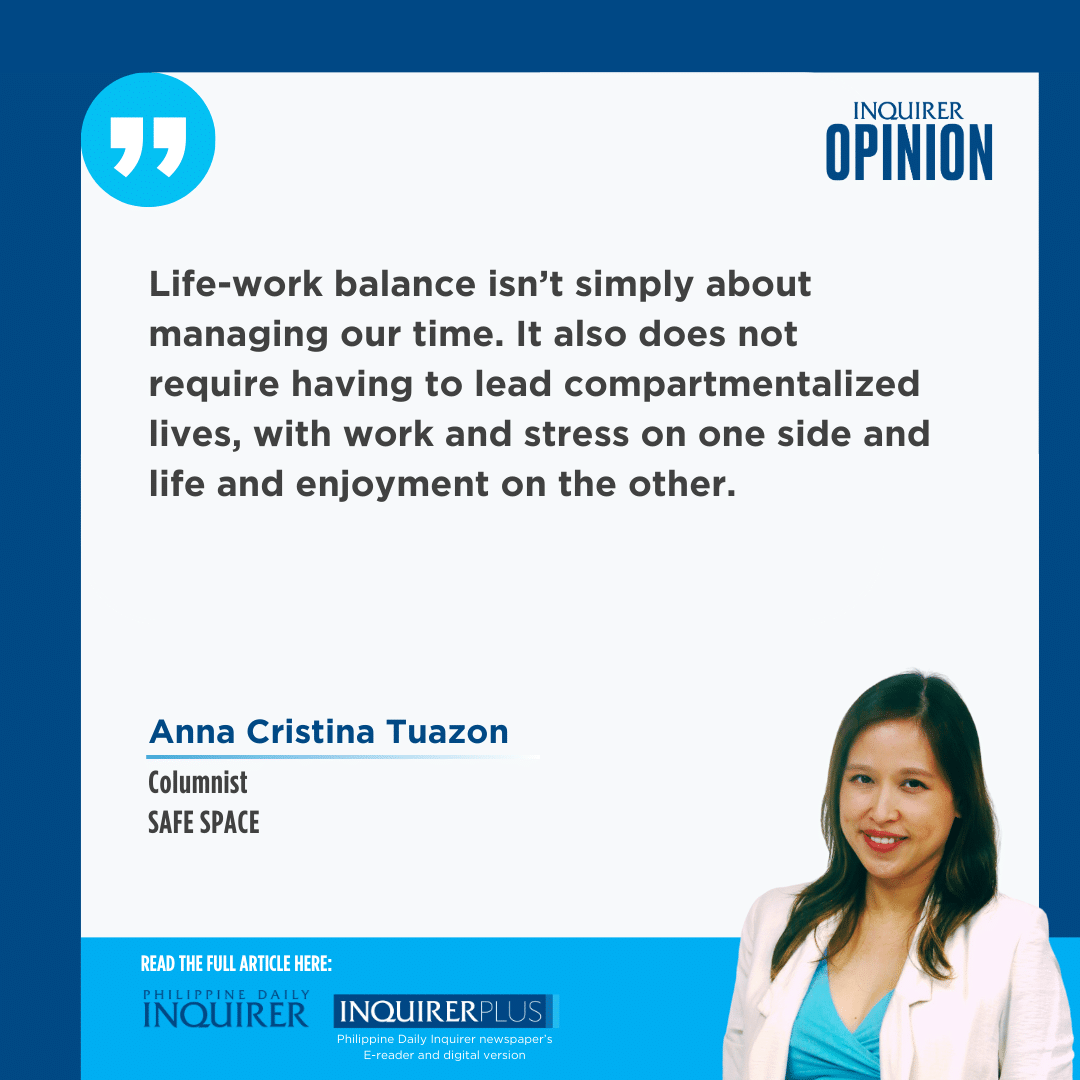Life-work balance
The Philippines ranked 59th out of 60 countries in the human resource services firm Remote’s Global Life-Work Balance Index 2024. Remote defines “life-work balance,” a reversal of the traditional “work-life balance,” as a system of ethics that ensures workers can “perform to the best of [their] capabilities when at work while enabling [them] to live a happy, healthy life outside of the workplace.” The index focused on business provisions such as minimum wage, leave benefits, safety, inclusivity, and health care. While companies and employers can do a lot to contribute to workers’ well-being, it made me wonder what else constitutes a thriving life-work balance for Filipinos?
I have been incredibly lucky that I have the kind of career that continues to flourish under work-from-home conditions. I was able to fulfill my work duties remotely, save for a few mandatory in-person meetings and events. Yesterday was one of those rare occasions, where I was compelled to leave my baby at home and commute to an interagency meeting in Manila. I dreaded the travel time—it was longer than the actual duration of the meeting itself—and the significant expense of the Grab ride that reached almost a thousand pesos.
The meeting itself was pleasant; in-person interaction was always more enjoyable than work-focused Zoom meetings. If not for traffic, I would’ve even looked for a snack after work, maybe take a quick look around and looked at the vendors’ wares. But the feeling of apprehension never left me and I immediately set for home, hoping to avoid the brunt of rush hour.
If I were to create an alternative universe for that day, it would be this: work would not be too far from home, travel time would be predictable, and there would be enough time and leisure to enjoy the journey. I would invite colleagues to merienda after the meeting. I would pass by the shops to pick up some office supplies and buy a book that I can read on the way home (my motion sickness does not exist in this alternate universe). Once I get home, there is still enough time to take my baby out for a stroll in a safe outdoor space before we prepare a homecooked meal.
Life-work balance isn’t simply about managing our time. It also does not require having to lead compartmentalized lives, with work and stress on one side and life and enjoyment on the other. I would argue that a balanced life is a centered life. And at the center is our values or what is truly important to us, whether that be us, family, or a higher power. A centered life, therefore, is where everything contributes to what is personally meaningful to us. Bouncing ideas around with coworkers in a meeting is meaningful because I value generating solutions. I enjoy their company because I value friendship and social interaction. I set limits at work because I value my personal space and identity outside of my profession. I say yes to some things because I value growth and I say no to other things because I value what I already have.
Life-work balance, as the Global Life-Work Balance Index indicates, is not just simply a personal endeavor. It is a system of ethics for institutions and communities. Does my company support the exercise of my values? This can be in the form of maternity benefits and a work process that complements my family life. This can be the acknowledgement that contribution and productivity are not solely measured by time spent on a project but also by quality and impact of our work.
Moreover, how can communities and public institutions support our right to live out our values? I wish to live in a neighborhood where my child can play outside without fearing for his safety—and not have to leave Metro Manila or live inside gated communities to do so. We should be able to spend quality time with our families without spending money, such as in public parks and playgrounds. Job opportunities shouldn’t be concentrated in city centers so that people do not have to travel far for work.
Distracting myself from motion sickness that day, I stared out the car window to view the bustle of the city. It was a diorama of Filipino life: a crowd of people flagging down jeepneys, mothers bouncing their babies as they chat with the neighbors, vendors waiting for customers in the sweltering heat, and carinderias packed full of hungry riders. There were women rushing in heels on cracked sidewalks, men in long-sleeved polos sweating even before they reached the office, neighborhood residents who clearly had just woken up, and the occasional security escort of government vehicles trying to make way for their bosses. I wonder how they would rate their life-work balance and what they would wish for to improve it.
What would your ideal life-work balance look like?
—————-
aatuazon@up.edu.ph





















